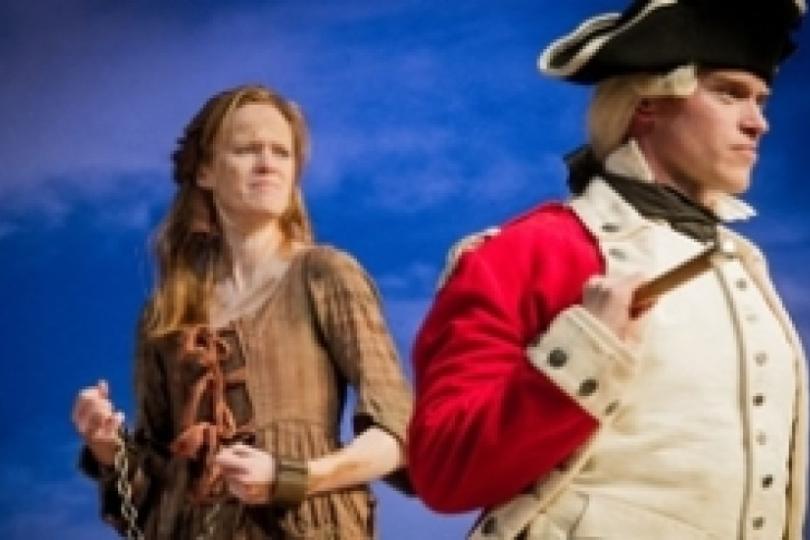REVIEW: 'Our Country's Good' at The Guthrie
Review

The Alternate Titles
1. "A Review of Our Country’s Good, Being a Skewering"
2. "But Really, the Production Values Were Quite High: The Blow By Blow"
3. "Again With the Filthy Whores: A Semantic Concern"
4. "Why This is Not a Modern Classic: On Critical Dissent"
On Subjectivity: A Disclaimer Stating the Obvious
Let’s all just pause a second and note that my personal POV on this play is my POV only, and not that of Minnesota Playlist or any other organizational body or 503c entity, or anyone or anything at all, just me, and my POV is subjective, much like the POV of any other individual consciousness, reviewer or otherwise, so, lest anyone feel compelled to say, or even cry out, "That is so subjective!!!!!!!" I hereby wish to agree heartily: this is, indeed, a highly subjective review.
Cute Little Anecdotal Lead-In
And so perhaps one or more variables came into play on the evening on which I attended Our Country’s Good, which was not good. Perhaps the fact that I thought, upon reading the local blurbs, "That sounds really boring" had already canted my POV too far, and rendered me unable to determine whether the show was good or not. Plus I had intended to see another show, but am such a freaking ditz I went to the WRONG THEATER and sat outside peacefully with my hands folded, worrying that the crowd seemed unnaturally small, for a very long time; so perhaps I was already predisposed to be wishing I was elsewhere anyway. Eventually I went to the Guthrie because it is famous and surely that must count for something; and the odds of finding a show on one of three stages were higher than finding one in a theater that was closed. So I stood in the three-person rush line to see this show, while next to me, in the line for Crimes of the Heart, a herd of mostly cheery, bespectacled souls stood with their heads cocked as they tried to figure out what was wrong with me, for reasons that remain unclear – I was totally zipped and had nothing on my nose. Lead-in fin.
HAVING PERHAPS PREDISPOSED MYSELF TO NOT LIKE IT, I found that indeed I did not. I did not like it Sam I am, I did not like it in a train, did not like it on a plane, did not like it on the stair, did not like it anywhere.
SO I WENT BACK THE NEXT NIGHT IN A BETTER MOOD, feeling more or less and chill and open-minded, and it was still not good.
SO I ASKED A COUPLE OF PEOPLE. Me: Did you see Our Country’s Good?
Them: No, did you?
Me: Yes.
Them: What did you think?
Me: I thought it was awful.
Them (shocked): Really? I heard it was fantastic! Well, I heard the original workshop* was just great!
*The original workshop of this play was done in London in 1988.
Flashback: The World c. 1988
I have bleached my hair orange with Sun-In. I slouch around in super-ratted bangs and pegged pinstriped jeans and white Keds that say in purple pen FUCK THE ESTABLISHMENT and I <3 TYLER. My Walkman is blasting a heavy rotation of Pat Benetar and The Cure into my risquély triple-pierced ears.
Meanwhile, in another part of the world…
The Soviet Union still stands, and so does the Berlin wall. The Iran-Iraq War comes to a bloody halt, morphing neatly into the Iran-Contra affair and an underground movement called al Qaeda. Reagan is president and there are rumors that A Black Man/Jesse Jackson might run. Kids still call each other "commies" and take enormous offense at being called gay. We are the Smoke Free Generation and everyone still smokes a pack a day. AIDS is epidemic. I write incendiary editorials in the Southview Bee supporting abortion rights and free speech and a coup against Republicans generally. We weep copiously at the INXS concert. We sob inconsolably in the girls’ bathroom. We frequently squeal. Salman Rushdie goes into hiding with a fatwa on his head. We look up the definition of fatwa, and steal The Satanic Verses and Fear of Flying from a regular bookstore in a regular world where Barnes and Noble, Starbucks, cell phones and the internet do not yet exist.
That year, M. Butterfly swept the American awards, Hapgood flopped, and Our Country’s Good nabbed three Oliviers; three years later, it was an award-winning hit on Broadway, and was soon being called "a modern classic."
But a classic would endure. Or at least that is my understanding of classic – it remains valuable, relevant, telling, provocative, long after the year in which it was a hit. Outside the context of history, perhaps this play would read differently; but plays do not take place outside the context of history. They arrive in the incessant now, dragging their historical moment behind them. This particular play arrives dragging perestroika and dusty cassette tapes, the Seoul Olympics and nuclear fallout drills, Christie Brinkley and a country that gave Reagan two terms with a straight face.
So what do Butterfly and Hapgood haul around? Their strengths and their flaws, and the time in which they were written – but a play with enduring power seems to morph with the social moment into something always new, always readable through the scrim of now. Those two are problematic plays whose problems remain relevant and whose concerns remain vital, plays in which the playwright has captured something about human experience that endures, for both good and ill. When the Guthrie mounted Butterfly a few years ago, it was as devastating – more so, actually – than it was in 1988. The productions I’ve seen of Hapgood in the last ten years are better – and more bitter, funny, and sharp of tongue – than those I saw when it first came to American stages in the mid-‘90s.
But Our Country’s doesn’t hold up.
The blow-by-blow of this show can be found in every other thing ever written about it, and there’s a fine B-B-B on Wikipedia as well, which is about 5 pages long and far more interesting than the play itself, and also curiously full of details the play does not include, themes the play does not explore, and a sense of momentum and narrative drive that the play utterly lacks. So I’ll skip the attempt to make this play within a play (o gosh how neat!) sound intriguing by noting that it’s just not. The history, however, is – and would that the history was anywhere evident in the play.
Set in a penal colony in the earliest years of British-run Australia, a passel of convicts shipped over from England are feeling bleak what with all the beatings and hangings, so a fine chap of a British marine decides to cheer them up by getting them to put on a play (the play within the play! Get it?! Infinite regress! Mirror held up to a mirror! Clever Shakespeare reference! Little Russian nesting dolls!). Our Country’s takes place over a few months during which the lowly, dirty, unredeemable convicts are (gasp!) redeemed, because upon their introduction to theater/(high, Western) culture, they are all stunned and overcome by the sheer wonder and humanity and unquestioned universality of theater/(high, Western) culture and their souls and minds are plucked from the gutter and SAVED!
And seriously then the Marine, who has been in love with the one curiously clean and pretty and secretly cultured convict since the start of the play – lo, unto masturbating to unchaste thoughts of her! onstage! tho admittedly behind a plank! – is able to In Good Conscience really fall in love with her, despite his wife back in England, who obviously is not a good metaphor.
But the thing is that convicts, especially fragile demure female convicts, are a GREAT metaphor, because you can save them! And in saving them you can do a 2.5-hr, basically plotless disquisition on Why Theater Matters, and the really super subtle subtext here is – wait for it – THEATER SAVES!
And I am pretty sure that – the simple fact that the play attempts to prove theater’s worth – is why this play is called “a modern classic,” which here can be understood as “a retread of every facile quasi-existential argument about the cosmic purpose of theater, traditionally taking place between two drunk asses trying to out-perform one another for the invisible audience that lauds and applauds them in their collective brain.”
But not only is Our Country’s Good dated, the arguments that can be made against it feel dated too. So ideally, this thing I’m writing would not be this thing, but would have been an academic paper on the colonialist fantasy inherent in the work &c. The academic paper would have been terribly of-the-moment in the middle years of post-modernism and the developing era of new language with which to name and explore facets of society that were taken as given – but right now, calling out a play for sexism, racism, and colonialism feels exhausting, because it feels self-evident.
On another note, almost totally unrelated but not, the play compulsively refers to Shakespeare without really examining why. It is a mishmash of Shrew, My Fair Lady, Pretty Woman, and Much Ado, with a dash of All’s Well that Ends Well. We have a dab of gender play. We have a spot of mildly amusing identity confusion. We have a broad gesture at dealing with classism by having people play two roles of different classes, and creating a little cross-referential love affair spring up betwixt. We have an almost literally endless debate among the marines (played by both women & men!) about whether those unsalvageable, half-human, lower-class critters will be allowed to put on a play – a debate presided over by the Good Kind General, who is gaudily kind, generous, and fair, and quotes (really?) Rousseau (“Man is born free, but everywhere is in chains”), and praises “the slave” for his innate capacity to get cultured if he only just applies himself studiously to the study of cultured things, and is SO nice you totally get the whole Divine Right of Kings thing.
These superficial nods to the intellectual fads of the late 1980s do a great deal to clutter the play – half-finished references, insider jokes, an excess of misogynistic language (Cunt: 5, Whore: 7; plus the really intriguing use of vaginal metaphor to describe, of all places, England(?)) – but do little to argue the play’s actual point: may I repeat? THEATER MATTERS.
The play – and the play within the play – make a case for the power of theater, and should stand as evidence in themselves. But structurally, philosophically, and linguistically, the play is shot through with suppositions that not only date (or to use a superultra 1988 word, “problematize”) the play, but date the critique the play attempts to make. The primary issue here is really simple: the assumption is that those who believe in the power of theater are the enlightened few, who must gently bring the ignorant, uncultured masses to the world of the stage. But that assumption – which in one sense congratulates the audience for its wisdom and taste – also traps the audience in the position of power. We are asked to root for the convicts, but told to identify with the captors. If we carry the play’s thesis out to its natural conclusion, we fancy ourselves a superior class of people, smug and towering above the unwashed and unredeemed.
With so much at stake, Our Country’s fails to inspire or persuade. Substituting didacticism for passion, patronization for compassion, it reminds the audience not that they love theater, but that they have theater, have culture, have access, and they continue to lord it above those who don’t.
In 1988, Garland Wright mounted a season that could have been said to be elitist, classist, et al ad nauseum – but it was also a season that did, I think, seek to provoke, and to look at things in a new light. Tennessee Williams, Euripedes, Moliere, Lorca, Shakespeare, Ibsen – whether or not you were a Wright supporter, you could not see that season without emerging changed.
During the scene of a heated debate about whether the play should go forward, one militantly anti-everything marine declares, “This play will bring down calamity!”
Not five minutes later, there’s this exchange:
Marine: But this play –
General: Will change very little.




